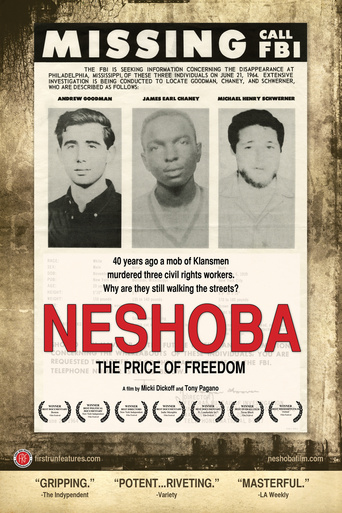steve m
So the best thing about this is the rawness and humanness of the people--both the people you feel for when you hear the awfulness of their pain at their loss remembered from 50 years ago (June 21, 1964), and the people you feel bewildered by as they express their frank racism and express astonishing ignorance about people.The story of Cheney, Goodman, and Schwerner is perhaps well-known. Goodman and Schwerner came down from New York, eager to do the right thing. They joined up with James Cheney, a native, and attempted to get people to register to vote or otherwise simply express their civil rights. They were arrested for speeding, jailed, and then released.Somehow (!) the Ku Klux Klan was notified that the three were traveling in the area. Three or four dozen men of Neshoba and the surrounding area attacked them after they were released, beat them, tortured them, really, and then killed them. (James Cheney, as the black guy, was especially tortured.) They buried the three in an earthen dam, and dozens and dozens of people were told about this act, as the men boasted of their actions to shut down the troublemakers.There was some activity in 1964 to indict these men, but nothing happened to most of them. Some served a few years for civil rights violations, but no murder charges.Forty years later, many of the culprits were still free. One of them, the ringleader, a preacher named Edgar Ray Killen, was still talking about it.A coalition of citizens got together just to talk about the situation, to find ways for reconciliation. Gradually they got more and more attention until the State of Mississippi took Killen to trial for the murders of these young men who were simply trying to help ordinary Americans exercise their civil rights.I won't tell you the ending. It's not what I expected.I will say that the documentary was extraordinary, because it comprises interviews of people from both sides of the situation--some who support the three guys, some who support the actions taken against them. (It is just astonishing to me to hear such racism be expressed so openly and proudly.) Somehow the filmmakers got people to trust them to open up and pour out their ideas and the secret things of their hearts.An excellent documentary not just for the subject matter, but also for the quality of the production and the craft that was used to get people to talk.
criticlh-1
During Freedom Summer 1964, three young civil rights workers were brutally murdered in Neshoba County, Mississippi, an event that inspired the theatrical film Mississippi Burning. Even though the identity of the killers was an open secret, no one was brought to justice for more than 40 years. Finally in 2005 the alleged ringleader, Rev. Edgar Ray Killen, was indicted for the murder of James Chaney, Andrew Goodman, and Michael Schwermer.Neshoba follows Killen throughout the trial, and for the first time gives us Killen's chilling racism in his own words. Interviews with family members of the three victims ground the film in the reality of the events of that summer, and the comments of residents make it clear that the city of Philadelphia and Neshoba County are still divided more than forty years after the murders. Some are struggling to come to terms with their own past, while others just wish people wouldn't keep bringing it up. The resulting film is a surprisingly balanced treatment of a potentially explosive situation, one that provides real insights into a society that produced state-sponsored terrorism.I saw this film almost on its home ground, at the Crossroads Film Festival in Jackson, Mississippi, where it was very warmly received. No one should see Mississippi Burning or Ghosts of Mississippi without also seeing Neshoba. And when you see it, don't get up to leave before the final credits, because they provide one last powerful and disturbing insight into the massive injustices of our nation's recent past.

